|
|
|
Sort Order |
|
|
|
Items / Page
|
|
|
|
|
|
|
| Srl | Item |
| 1 |
ID:
143633
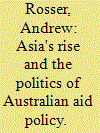

|
|
|
|
|
| Summary/Abstract |
The economic rise of developing Asia has given impetus to debates over the geographic orientation, strategy, organisation, and collaborative relationships of the Australian aid programme. This paper examines these debates, Australian government responses, and the politics underlying these responses. It points to, among things, the different ways in which the Labor Party and the Liberal–National Coalition have dealt with these issues, reflecting their different constituencies and foreign policy philosophies. The paper also assesses the future trajectory of Australian aid policy, in particular, the extent to which it is embracing the Chinese model of aid.
|
|
|
|
|
|
|
|
|
|
|
|
|
|
|
|
| 2 |
ID:
139444
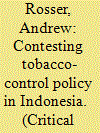

|
|
|
|
|
| Summary/Abstract |
Over the past decade and a half, the Indonesian government has progressed fitfully and inconsistently toward a stricter tobacco-control policy regime, albeit without much impact on the country's worsening tobacco epidemic. This article explains this pattern of reform in terms of the unequal but changing relationship of power between tobacco companies and tobacco farmers, on the one hand, and tobacco-control advocates based in NGOs, health professional organizations, universities, and international organizations, on the other. The first of these coalitions has had greater structural leverage, better political connections, stronger organizational capacity, greater ability to mobilize popular forces, and more capacity to cultivate a positive public image. But the second coalition has been able to exercise some influence over policy because of changes wrought by democratization. In this analysis, the author engages with the literatures on (1) Indonesia's political economy in the post–New Order period and (2) the politics of tobacco control in developing countries. With regard to the former, the author argues that we need to give greater attention to the role of actors previously excluded from the policy-making process than is currently the case. With regard to the latter, the author contends that more focus is needed on domestic actors and political institutions in shaping tobacco-control policy. Looking to the future, the author suggests that further progress in Indonesia's tobacco-control policies will be contingent upon an ongoing process of struggle; however, there are signs that the tide is turning in favor of the second coalition.
|
|
|
|
|
|
|
|
|
|
|
|
|
|
|
|
| 3 |
ID:
098940
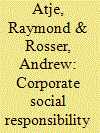

|
|
|
| 4 |
ID:
143628
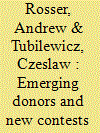

|
|
|
|
|
| Summary/Abstract |
The rise of emerging donors has unleashed new political contests over aid policy, some of which have occurred at the domestic level. This article locates the special edition's analysis of these contests within the existing literature on emerging donors, draws out the key findings of included papers, and considers their implications for policy. It argues that domestic contests have had significant influence over aid policy in both emerging and established donors, the agendas at work have varied from case to case reflecting countries' different political economies, and aid policies represent a ‘work-in-progress’ rather than an expression of immutable models.
|
|
|
|
|
|
|
|
|
|
|
|
|
|
|
|
| 5 |
ID:
143581
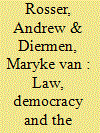

|
|
|
|
|
| Summary/Abstract |
In recent years a debate has emerged about the conditions under which justiciable legal frameworks facilitate the fulfilment of socioeconomic rights. This debate has pitted institutionalist perspectives that emphasise the progressive potential of democratisation against structuralist perspectives that emphasise the constraints imposed by relationships of power and interest. This paper considers the debate in light of Indonesia’s recent experience. It suggests that we need to examine how institutional and structural factors interact within particular contexts to shape socioeconomic rights fulfilment, not examine these factors in isolation. It also considers the strategic implications of this argument for rights proponents.
|
|
|
|
|
|
|
|
|
|
|
|
|
|
|
|
| 6 |
ID:
083215
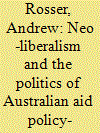

|
|
|
| 7 |
ID:
094443
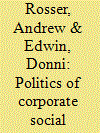

|
|
|
|
|
| Publication |
2010.
|
| Summary/Abstract |
In July 2007, Indonesia became the first country to introduce mandatory legal requirements for corporate social responsibility when the Indonesian parliament passed Law 40/2007 on Limited Liability Companies. This paper examines the political dynamics that shaped this and subsequent regulatory developments related to corporate social responsibility and assesses the likely future direction of Indonesia's corporate social responsibility policies. We argue that policy debates over corporate social responsibility in Indonesia have reflected a struggle between the dominant sections of Indonesia's capitalist class, local communities that have been negatively affected by corporate activity and their allies in the non-governmental organization movement, and predatory elements in the political parties and bureaucracy for control over the economic resources generated by the activities of major corporations in that country. We argue that the dominant sections of Indonesia's capitalist class have so far won this struggle in large part because of their instrumental connections to senior Golkar figures within the government. With respect to the future direction of corporate social responsibility policy, we argue that much will depend on the outcome of future presidential elections. If these elections produce a political leadership that supports a mandatory approach to corporate social responsibility, there is some chance that mandatory requirements for corporate social responsibility in Law 40/2007 will be implemented. If they result in the election of a leadership that does not support a mandatory approach to corporate social responsibility, by contrast, such a change is unlikely.
|
|
|
|
|
|
|
|
|
|
|
|
|
|
|
|
| 8 |
ID:
128532
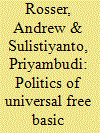

|
|
|
|
|
| Publication |
2013.
|
| Summary/Abstract |
Since the fall of Suharto's New Order, Indonesia's central government has substantially strengthened the legal and financial basis of universal free basic education (UFBE). Yet sub-national governments have varied considerably in their responses to the issue with some supporting UFBE and others not. Why has this happened? What are the implications for the future of UFBE in Indonesia? And what does Indonesia's sub-national experience tell us about the political preconditions for UFBE in developing countries? We try to shed some light on these questions by examining the politics of UFBE in Bantul and Sleman, two districts in the Special Region of Yogyakarta.
We argue (i) that these districts' different responses to UFBE have reflected the extent to which their bupati have pursued populist strategies for mobilising votes at election time and there has been resistance to UFBE from groups such as business, the middle classes, and teachers; (ii) that Indonesia's sub-national experience suggests that there is an alternative pathway to UFBE besides organisation of the poor by political entrepreneurs; and (iii) that the future of UFBE in Indonesia thus rests on the nature of bupatis' strategies for advancing their careers and the strength of local groups opposed to UFBE.
|
|
|
|
|
|
|
|
|
|
|
|
|
|
|
|
| 9 |
ID:
182700
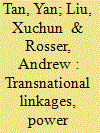

|
|
|
|
|
| Summary/Abstract |
While accepting that the migration–development nexus is best understood from a transnational perspective, recent studies analyse this nexus in a partial way rather than holistically. We review the literature, then attempt an enriched account of the complex and rapidly evolving relationship between diaspora and development in China – a country undergoing profound demographic, economic and social changes. Using in-depth interviews with a variety of key informants or stakeholders and a transnationally oriented framework, we analyse features across three core policy dimensions that incorporate both international and domestic dynamics: citizenship, top talent recruitment and soft power. Our findings contribute to the literature on Chinese-state-diaspora relations. They show that China's approach to its diaspora policy and development, practice and outcomes reaches with powerful new effects across national borders. The transnational–relational perspective gives an optimal paradigm for researchers and policymakers to understand changing strengths and complexities in interactions (contestation, conflict, negotiation, cooperation) between multi-scalar and multi-dimensional linkages, and to form diaspora policy and engagement programmes responsive to unprecedented global political, economic and social disruption.
|
|
|
|
|
|
|
|
|
|
|
|
|
|
|
|
| 10 |
ID:
140718
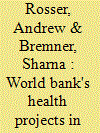

|
|
|
|
|
| Summary/Abstract |
The World Bank's health sector projects in Timor-Leste have been among the few operations it has funded in that country that have achieved any sort of positive results. This paper examines the factors underpinning their relative success and considers the wider lessons for the delivery of effective aid in the context of peace-building operations in fragile contexts. We argue that political economy factors played an important role in shaping the relative success of these projects, extending and revising an earlier analysis by Rosser. In terms of wider lessons, we argue for a more political understanding of the determinants of aid effectiveness. Specifically we suggest that aid effectiveness needs to be seen as a function not just of the technical quality of project design and the administrative competence of project managers but also the extent to which there is congruence between donor and local elites’ agendas.
|
|
|
|
|
|
|
|
|
|
|
|
|
|
|
|
|
|
|
|
|